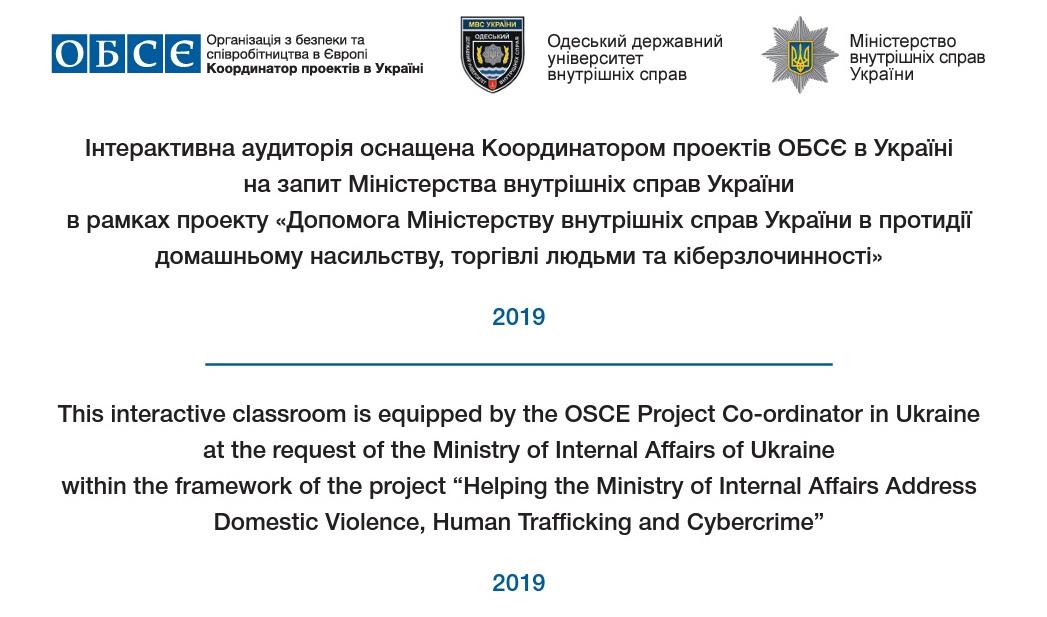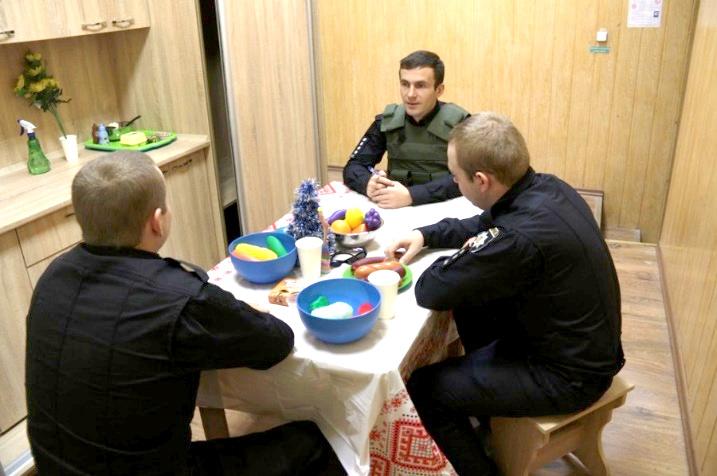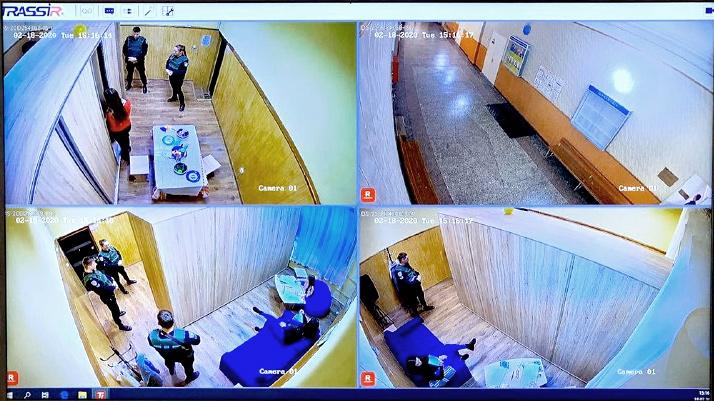
11 minute read
FORMS AND METHODS OF POLICE TRAINING IN THE FIELD OF PREVENTING AND COUNTERING DOMESTIC VIOLENCE: EXPERIENCE OF UKRAINE Odessa State University of Internal Affairs, Odessa, Ukraine
scientific journal of the modern education & research institute FORMS AND METHODS OF POLICE IN THE FIELD OF PRE VENTIN G AND COUNTERIN G DOMESTIC VIOLENCE EXPERIENCE OF UKRAINE
Kovalyova lena Volodimirivna (kovalyova@email.ua)
Advertisement
dessa State niversity of nternal ffairs ( S
bstract

The article deals with modern forms and methods of training and professional development of police officers who respond to cases of domestic violence in Ukraine. Particular attention was paid to the methods of forming the relevant skills and abilities. The experience of using interactive rooms for practicing skills in responding to cases of domestic violence was demonstrated. The importance of interdepartmental training on preventing and combating domestic violence was emphasized.
Keywords: police officers; forms of preparation; preparation methods; domestic violence; warning; opposition; interactive audience.
Since 2001, a state policy has been implementing in Ukraine which is aimed at preventing and combating domestic violence. In 2017, significant changes were made with the adoption of the Law of Ukraine «On Preventing and Countering Domestic Violence» [1], to the regulatory framework for activities in the field of preventing and combating domestic violence, including a comprehensive approach to solving this problem, namely, four equally important areas: prevention; bringing to responsibility and changing the behavior of the aggressor; providing assistance to victims; effective interaction of all entities that carry out activities in this area. The circle of subjects has been significantly expanded, but one of the key roles in the implementation of this activity belongs to the police. The police powers in the field of preventing and combating domestic violence have been significantly expanded and include: identifying the facts of domestic violence and timely response to them; receiving and considering applications and reports on the commission of domestic violence, taking measures to stop it and providing assistance to victims, taking into account the risk assessment; informing affected persons about their rights, measures and social services that they can use; issuance of urgent protective orders against the aggressor; registration of the aggressor and carrying out preventive work with him; control over the implementation of special measures to counter domestic violence by aggressors during their validity period; cancellation of permits for the right to acquire, store, carry weapons and ammunition to their owners in the event of domestic violence, as well as confiscation of weapons and ammunition; interaction with other actors in preventing and countering domestic violence. At the same time, police officers are given the right to enter a home without a reasoned court decision in urgent cases related to the termination of an act of domestic violence that occurs in the event of an immediate threat to the life and health of the victim [1].
The effective implementation of these powers requires an appropriate quality of training for police officers, both future and current. At the same time, it is important to take into account the specialization of police officers in the training process. So, the police officers who are authorized to respond to cases of domestic violence in Ukraine can be from such departments as: patrol, district, 30
juvenile police. Given that domestic violence has been criminalized in Ukraine since 2019, investigators should have appropriate training now.
In accordance with the Law of Ukraine «On the National Police» [2], professional training of police officers consists of: 1) primary vocational training, which is carried out for 3-4 months for police officers who are first recruited into the police force, in order to acquire special skills necessary to perform police powers. 2) training in higher education institutions with specific learning conditions (there are 7 of them in Ukraine). Special attention should be paid to the modern approach to professional development of teachers of higher educational institutions with special training conditions. In order for the teachers to have not only a theoretical knowledge base, but also practical experience in policing, once every three years they are sent for at least six months to update their knowledge in practical police units according to the disciplines they teach. This allows to make closer the theoretical material to the needs of the practical activities of the police. 3) postgraduate education, which includes: specialization; retraining; advanced training and internship. All police officers undergo advanced training on the basis of higher educational institutions with specific training conditions at least once every three years or before being appointed to a leading position in accordance with the schedules which are approved by the National Police of Ukraine. 4) service training, which includes the following types of training: functional, general, tactical, fire, physical, and provides a system of measures aimed at consolidating and updating the necessary knowledge, skills and abilities of a police officer, taking into account his profile of activity. Forms of service training include: training sessions in groups at the place of service; training fees at the training center; independent training (carried out during the entire period of the police officer’s service with the aim of continuous, systematic replenishment and deepening of knowledge, skills and abilities necessary for the successful solution of official tasks).
The procedure, organization and timing of vocational training is determined by the Ministry of Internal Affairs of Ukraine [2].
It is important that the topic of preventing and combating domestic violence is included in the curriculum for advanced training of all levels of training and all police units, it is done due to the urgency of the problem of domestic violence and the importance of familiarizing all police officers with the legal and regulatory framework for combating it.
However, most of the attention to this topic was paid in the process of training prevention units, as well as specialized units – mobile groups to counter domestic violence, which have been operating in all regional centers of Ukraine since 2018. In the process of training these categories of police officers, innovative teaching methods are used, aimed not only at the formation of knowledge, but also skills and abilities.
Thus, with the support of the Office of the OSCE Coordinator in Ukraine, three higher educational institutions with specific training conditions of the Ministry of Internal Affairs of Ukraine (in the cities of Lviv, Dnipro and Odesa), as well as at the Police Academy in Kiev, where the primary training of police officers is carried out, interactive classrooms for practicing police response skills in cases of domestic violence were created (Pic. 1).
Figure 1

An interactive auditorium is a complex of premises, one of which is an imitation of an apartment, which consists of four locations – entrance doors, kitchen, room and corridor. Each of the locations is equipped with furniture and technical equipment such as video cameras and microphones (Pic. 2, Pic. 3).

Figure 2

Figure 3
Images from cameras and sound from microphones are transmitted to a screen located in the classroom (Pic. 4). The classroom is equipped with transformable furniture, which allows you to organize space for work in groups and use the classroom for training sessions.
Also in the classroom there is a microphone, with the help of which the teacher can transmit information to the extras who are in the simulated apartment about the beginning and end of the script playback.

Figure 4
As extras for playing the roles of the aggressor, victim, children, neighbors and other possible participants in the conflict, both teachers and the cadets themselves or students of advanced training courses are involved.
The cadets who are in the classroom observe on the screen and analyze the algorithm of the actions of the «police» on the situation of domestic violence. After the end of the scenario playing in the classroom with the moderation of the teacher, a discussion takes place. Thanks to the complex of audio and video equipment, it is possible to record, save and reproduce the course of a role-playing game in a simulated apartment, repeatedly view, discuss and analyze with cadets or police officers who are undergoing advanced training.
The layout of the premises makes it possible to trace the actions of police officers who arrive at the scene of domestic violence, and to analyze: their observance of personal safety measures from the moment
they enter the premises; the legality of entering the apartment; identification of the offender and clarification of the circumstances of the incident; compliance with the rules of communication with the victim and other parties to the conflict; application of special measures to counter domestic violence, as well as special equipment and physical force to stop the fact of domestic violence.
As known, you can perfectly know the legislation, but get confused when applying it. The interactive audience allows not only to get knowledge, but also to develop the skills and abilities of the police response. The training ground consists of two rooms, one of which imitates a real apartment, and the other is a classroom with modern equipment. The teacher chooses a specific scenario in accordance with the topic of the lesson and the cadets are united into several groups – some play the role of extras (offenders, victims, witnesses), others get a job assignment as police officers, and others – watch the events at the training ground on the screen and analyze actions of their colleagues. After finishing playing, if necessary, you can play the video on the screen in the classroom and analyze step by step what has been performed successfully and what not. The scenarios change every time and the cadets (listeners) do not know what to face while crossing the threshold of the simulated apartment. It is important not to get confused, to act in accordance with the requirements of the law and at the same time not to forget about personal safety. It happens that a domestic aggressor will suddenly use a knife to attack the policemen or throw a grenade in their direction from behind the opened door. Everything is like in real life. The only difference is that you can make mistakes without harm to life and health. It is the analysis and correction of mistakes made at the training ground, the formation of «muscle memory» that is the key to preserving the life and health of police officers when responding to service assignments in practice.
Thus, during the lesson we have a real opportunity to work out the tactics of police actions when responding to facts of domestic violence. Conducting classes in an interactive classroom confirms that the use of interactive methods in police training is an effective teaching method. This is confirmed by the results of the survey – 95% of all cadets and police officers who are trained using the interactive method, have noted its effectiveness.
In addition, given that, with the changes in the legislation, the range of subjects of responding to cases of domestic violence has significantly expanded and one of the fundamental rules is to establish effective interaction between them, during the training of police officers on preventing and combating domestic violence, binary classes are successfully introduced – a teacher and an invited representative one of the subjects – free legal aid, a service for children, a center for social services, a social welfare department, a mobile team of social and psychological assistance, a shelter for victims of domestic violence, a public organization with a hot line on combating domestic violence. The representatives of the subjects familiarize the cadets and listeners with the peculiarities of the activities of their service regarding the prevention and counteraction of domestic violence, the problems that arise when interacting with the police, found practical solutions to the problems that arise, thereby contributing to the formation of a comprehensive understanding of the system of prevention and counteraction of domestic violence among police officers. Since domestic violence is a complex problem, only one service cannot solve it; a comprehensive coordinated approach of all actors is needed, a clear and high-quality implementation of their powers, without which the overall possibility of effectively solving the problem of domestic violence is reduced.
The complexity of the problem of domestic violence also determines the need for interdepartmental training of representatives of the subjects of preventing and combating domestic violence. When teaching representatives of one of the subjects, especially when studying the features of interaction with other subjects, comments often arise about the fact that other subjects do not work properly, that their activities are ineffective. Therefore, in Ukraine, with the assistance of non-governmental and public organizations, it is practiced to conduct intersectional trainings, which are simultaneously attended by representatives of different subjects: police officers, judges, social workers, lawyers of free legal aid centers, employees of the service for children, educational institutions, health care, etc. ... Such trainings are more effective in establishing communication and referral of affected individuals. However, no less important is the institutionalization of intradepartmental training of representatives of the subjects. Therefore, today, at the national level, there is a discussion of the need to develop uniform training standards and the mandatory introduction of modules dedicated to preventing and combating domestic violence into the training system for all subjects.
Thus, successful training of police officers in the field of preventing and combating domestic violence should include: considering the specialization of the police officer; systematic approach and frequency of
professional development; using interactive training methods to develop skills and abilities to respond to cases of domestic violence, including interactive classrooms; interdepartmental training, as well as conducting binary classes.
eferences

1.
2. Law of Ukraine «Preventing and Countering Domestic Violence» dated December 07, 2017. URL: https://zakon.rada.gov.ua/laws/show/2229-19#Text. Law of Ukraine “On the National Police” dated July 02, 2015. URL: https://zakon.rada.gov.ua/laws/ show/580-19#Text.



